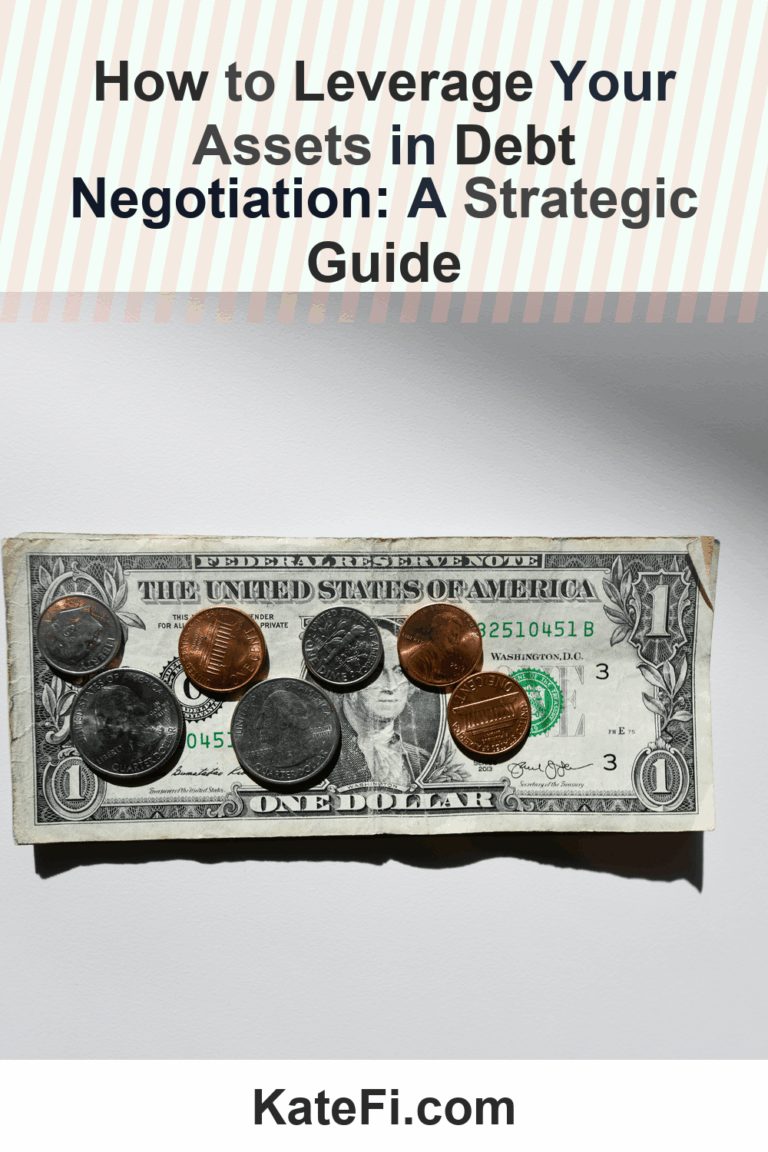How to Leverage Your Assets in Debt Negotiation: A Strategic Guide
In today’s economic landscape, the challenge of managing debt can feel overwhelming, especially if you’re uncertain about your assets and how to utilize them strategically in negotiations. If you’re contemplating debt relief or considering your options, you’re not alone. Many people are navigating similar waters, and having a clear strategy can make all the difference.
Love our content? Show your support by following us — pretty please!🥺
FOLLOW ON PINTEREST
Hi! I’m Kate, the face behind KateFi.com—a blog all about making life easier and more affordable.
In this guide, we’ll answer some common questions regarding leveraging assets for debt negotiation, focusing on negotiation tactics, hardship documentation, and the importance of consulting a professional. Let’s dive in!
1. What does it mean to leverage my assets in debt negotiation?
Lower Your Unsecured Debt
If you have $5,000+ in credit card or personal loan debt, a free consult can review options like settlement or hardship plans.
- One-on-one call to review your debts and goals
- See potential monthly payment reductions
- No obligation to enroll
Not available in IL, KS, OR, TN, UT, WV.
Leveraging your assets means using what you own—like property, savings, or other valuable items—to strengthen your position in negotiating your debt. When negotiating with creditors, demonstrating that you have resources can sometimes lead to more favorable settlement terms.
2. How can I identify my assets for negotiation purposes?
Start by making a list of all your assets, which may include:
- Real estate (homes, rental properties)
- Vehicles (cars, boats, motorcycles)
- Savings accounts
- Investments (stocks, bonds)
- Personal belongings (jewelry, collectibles)
A clear inventory will help you articulate your financial situation during negotiations.
3. What types of debts can I negotiate using my assets?
👉 Start Your Free Debt Relief Review
Not available in IL, KS, OR, TN, UT, WV.
Most unsecured debts are negotiable, including:
- Credit card debt
- Medical bills
- Personal loans
If you have assets, creditors may be more willing to negotiate a settlement amount. It’s essential to present your case effectively.
4. How does hardship documentation play a role in negotiations?
Hardship documentation serves to demonstrate your current financial struggles to creditors. This can include:
- Recent pay stubs
- Bank statements
- Tax returns
- Proof of unemployment or medical issues
Having these documents on hand can bolster your negotiation strategy by showcasing your need for debt relief. If you’re unsure how to gather this documentation, consider a free consultation at KateFi to help you review your situation.
✅ See If You Qualify for Debt Relief
5. Can I negotiate if I am currently in collections?
What You’ll Learn on the Call
- Estimated timeline and monthly payment range
- How credit may be affected in the short term
- What documents to gather to move faster
Not available in IL, KS, OR, TN, UT, WV.
Yes, negotiating with a collections agency is possible, but it may require a different approach. When your debt is in collections, the agency often buys it for less than you owe, giving them more flexibility in negotiations. Be prepared to offer a lump-sum payment or set up a payment plan that works within your financial capabilities.
6. What are the potential outcomes of negotiating my debt?
Negotiating your debt can lead to:
- Reduced total debt owed
- Lower monthly payments
- Waived fees or penalties
Remember, while you might not achieve a perfect outcome, even partial debt relief can provide significant relief.
7. How do I start a negotiation with my creditor?
Follow this simple checklist when preparing to negotiate:
- Gather Documentation: Collect your financial documents, including hardship proof.
- Know Your Assets: Be prepared to discuss what you can leverage.
- Set Your Offer: Determine a reasonable offer based on your finances and what you can afford.
- Contact Your Creditor: Initiate the conversation and present your case calmly and clearly.
Consider practicing a script beforehand to improve your confidence during the call.
8. Should I consult a professional before negotiating?
Absolutely! Debt relief professionals can provide tailored advice based on your unique situation. They can help assess your assets, strategize your negotiation, and even handle communications with creditors on your behalf. Consider taking advantage of a free consultation to discuss your options.
✅ See If You Qualify for Debt Relief
9. How does negotiating affect my credit score?
Negotiating your debts can impact your credit score. If you agree to a settlement, it may be noted on your credit report as “settled for less than owed,” which could lower your score initially. However, over time, making timely payments on remaining debts can improve your score. Always consider the long-term effects before negotiating.
10. What should I avoid when negotiating my debt?
Avoid these common pitfalls:
- Making emotional decisions: Stay calm and focused on your financial goals.
- Ignoring documentation: Always have proof ready to support your claims.
- Accepting the first offer: Don’t rush; counteroffers are expected in negotiations.
A strong strategy involves patience and thorough preparation.
11. What are common creditor tactics during negotiations?
Creditors may employ several tactics, including:
- Offering lower settlements only if paid in full immediately
- Trying to make you feel guilty about your debt
- Asking for more information than is necessary
Be prepared for these tactics and remain assertive in your negotiations.
12. How can I maintain motivation during the negotiation process?
Keeping your eyes on the prize can help you stay motivated. Here’s a practical checklist:
- Set specific goals for what you want to achieve through negotiations.
- Celebrate small wins, like successful reductions in debt.
- Lean on support from family, friends, or financial professionals.
Having a clear vision will encourage you to stay committed.
Conclusion: The Path to Financial Freedom
Negotiating debt can seem intimidating, but by leveraging your assets and documenting your hardships, you can significantly improve your chances of achieving a favorable outcome. Remember, the journey may have ups and downs, but with the right approach, you can navigate through it successfully.
If you’re ready to explore your options and see what solutions may be available, don’t hesitate to reach out for a free consultation. You deserve to take control of your financial future!
✅ See If You Qualify for Debt Relief
Important: This content is for education only—not legal, tax, or financial advice. Results and eligible programs vary by situation and state. Fees apply if you enroll and complete a program. Debt relief can affect credit; missed payments may lead to collections/lawsuits. Not available in IL, KS, OR, TN, UT, WV.
This comprehensive guide should serve as a solid foundation as you embark on your debt negotiation journey. Embrace the opportunity to turn your financial situation around!






















